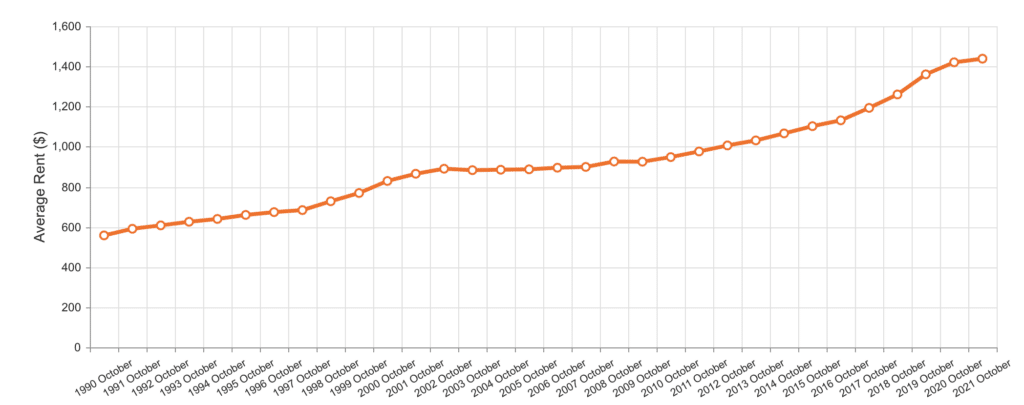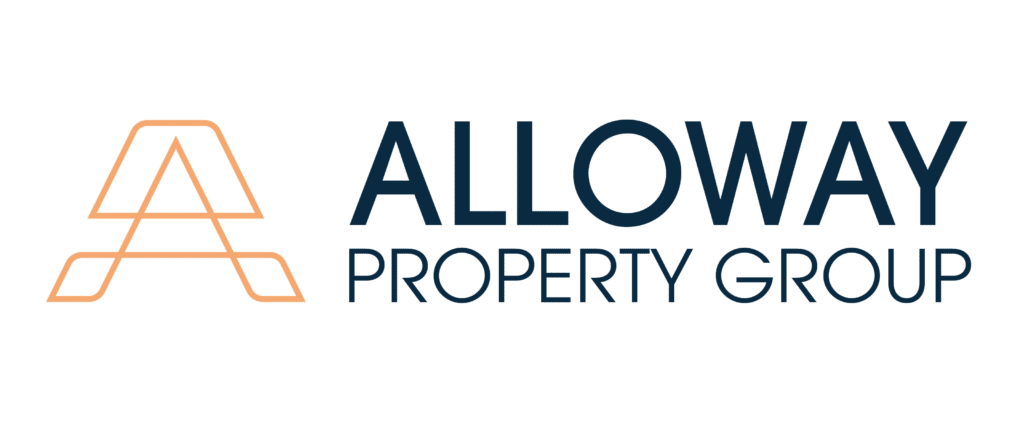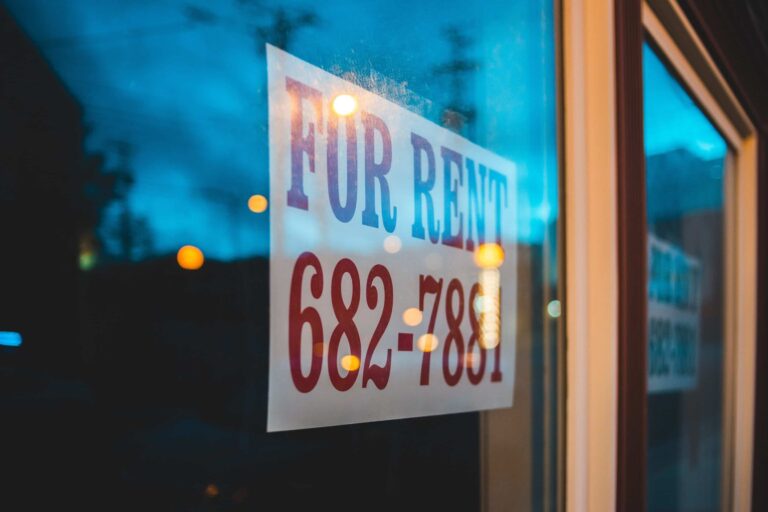When a tenant agrees to rent a property from a landlord, the rate is usually predetermined for the length of the term. In most standard 1-year residential leases, the rent payable remains the same for every month. However, should a tenant choose to stay, the landlord can begin increasing the cost of the lease. Rent control provisions govern how much and how quickly a landlord can raise the rent.
What is Rent Control?
In Ontario, residential rent control guidelines are restrictions that landlords must follow when raising the rent payable for a dwelling unit.
In order to understand how rent control in Ontario works, it is first important to understand the standard residential tenancy in Ontario.
Fixed vs Periodic Tenancy
Most standard residential leases in Ontario a for a fixed term; typically one year. During the term, the rent payable is set at a fixed rate per month.
However, upon expiration of the term, the agreement does not automatically renew for additional 1 year increments. Instead, the tenancy converts from fixed to periodic.
For example, instead of a 1 year term of 12 months, the tenancy becomes month-to-month, with each month being seen as its own “term”.
In periodic tenancies, the landlord and tenant have no further obligations to one another beyond the current period (except for some notice provisions).
For example, with proper notice, the tenant can vacate the unit. Similarly, the landlord can ask the tenant to leave under certain circumstances.
Once per year, the landlord is permitted to raise the rent payable – often within the rent increase guidelines. The restrictions imposed on the landlord in raising the rent is referred to as rent control.
What is the Rent Guideline increase for Ontario for 2024?
For 2024, the Rent Control guideline limit for rent increases is 2.5%. In Ontario, the government publishes an annual guideline limit for rent increases. This sets the maximum amount that landlords can raise rent per year.
The previous rent control guideline increases have been:
2023: 2.5%
2022: 1.2%
2021: 0%
2020: 2.2%
2019: 1.8%

Compounding Rent Guideline Increase
A common question regarding rental increases relates to missed guideline increases. If a landlord didn’t raise rent in a prior year, they cannot compound the prior missed guideline increases. The Guideline increase limit represents the maximum a landlord can raise the rent for a tenant in a year.
Similarly, a landlord cannot retroactively provide notice of increase and demand the tenant pay the difference.
Exemption from Rent Control
New Buildings, built and first occupied after November 15, 2018 are exempt from Rent Control. If the property was built and occupied after this date, landlords can raise rent by how much ever they want.
There are two important things to note regarding units exempt from Rent Control. First, as with non-exempt buildings, Landlords can raise rent only after the tenancy converts to periodic. Any tenancy on a fixed term (for example, a 1 year agreement) is locked in for the duration of the term. Second, even if there is no limit to the amount a landlord can raise rent, the landlord can only do so once per year.
This law was enacted by the Ford Government in 2018 to promote construction and housing availability in Ontario.
A tenant that left an older building during COVID for cheaper rent, might now be facing significant rent increases because of the building occupancy date.
How to Raise the Rent in Ontario
All rental increases must be accompanied by notice in writing via form N1 or N2. Notice must be given a minimum of 90 days in advance.
Form N1 is used for rental increases subject to a guideline limit. Form N2 would be used when the unit or units are partially exempt from rent control provisions. Both forms are PDF fillable and available on the Landlord and Tenant Board website.
Even if a Landlord & Tenant agree, there is no way to legally raise rent above the guideline (if not exempt) under a current lease. The easiest way to raise rent substantially, with tenant consent, would be to sign a new lease.
Rent Control: Tying Up Loose Ends
Rent control exists to protect both Landlords and Tenants in Ontario. At times, above guideline increases may be required to promote the health and safety of a unit. With the recent increase in utilities, an all-inclusive rental unit may be stifling a landlord’s margins or make it impossible to own the property while tenanted. In these cases, the Landlord can apply to the Landlord & Tenant Board (LTB) for an above-guideline increase. Other examples of situations where this might occur are extraordinary increases in operating expenses, or completion of large capital expenditure projects.
Before applying to the LTB, it’s best to speak with your tenant to see if a compromise can be made. Remember: Good tenants are hard to find!
Do you have questions regarding Rent Control in Ontario? Contact Us.






58 Responses
A housing unit that is not under rent control because it was built after 2018, does that mean it is not subject to the jurisdiction of the landlord tenant board if there are any disputes between the tenant and the landlord?
Hi Mazin – the only exemption is rent control. For all disputes (in Ontario) the Residential Tenancies Act would still apply and the LTB would still deal with issues pertaining to it. Important to note is that the rent increase guideline is exempt but you can still only raise rent once per year.
Do all apartment buildings that are built after 2018 subject to rent control or not at all? Can the rent be increased at any time, at any amount, if the building is just newly built and just started accepting applications? How can we know for sure?
Hi Viktoria, great question. Even if the building is not subject to the rent increase guidelines (first occupied after Nov 2018), it is still subject to the provisions for rental increase as outlined in the Residential Tenancy Act. So, in a month-to-month tenancy, you can only raise the rent once per year, but there would be no limit or restriction on the amount that the rent could be raised by. Hope this helps!
Can a non-profit organization, in Ontario, that is renting a residential apartment be served with the Form N2- Notice of Rent Increase Unit Partially Exempt?
Hi Jenn – the test for the form N2 would depend on the lease itself, not necessarily the tenant. So if you have a residential lease and the unit was partially exempt and the notice was served in accordance with the provisions of the RTA, then it would be valid. For more specific assistance, we recommend you contact a lawyer or paralegal.
What does FIRST occupied mean? I’m not the first tenant, but the building was built after 2018. Also if my lanlord has not given me my n1 90 days notice can he still raise the rent to anything he wants?
Hey Laura – great question! First occupied means any unit occupied for residential purposes after that date. This includes new condos, most basement apartments, and additions to existing buildings. You do not have to be the first occupant for the building to be exempt. If the tenant before you was first and still after the date the unit is still exempt.
Your landlord still needs to follow the requirements by providing the proper notice.
If your landlord isn’t providing the notice or is trying to raise the rent and may not be honest about first occupancy or is outside of the 1 year provision, you can challenge it via the Landlord and Tenant Board.
What if I bought at pre-con but didnt close fully until after 2018? Does that fall under this category as well
Hi Sonia – it would depend on when the unit was first occupied i.e. when the first person (tenant or owner) moved into the property. The date of purchase or title transfer has no effect.
Are units in condo buildings considered individually when it comes to rent exemption? Example my unit was new and occupied on Nov 28, 2018. Another unit in the same building was new and occupied Nov 2, 2018. Both units were rented out to tenants on those days. Would one unit qualify for rent control and the other unit not?
Or does the whole condo building fall now under rent control because the one unit was occupied Nov 2?
It is specific to the unit, when it was first occupied, not when the certificate is granted. The certificate may give you a general idea, but it still is based on the day of moving in.
Hello Baron,
If I build a new basement apartment in my 2009 built house (occupied by me)will that new basement apartment be exempt from rent control ?
Also, is it possible to increase rent above guidelines for units which come under the rent control act, based on increase in property taxes ?
Thanks
Hi Ned, with respect to your request RE taxes, you’d have to apply for an above-guideline increase with the Landlord and Tenant board and cite extraordinary circumstances in increased operational cost. This would be form L5. However, in this case I think it is doubtful you’d be successful as property taxes are the responsibility of the owner.
With respect to your question regarding rent control exemption, here is the text from Section 6.1 of the Residential Tenancies Act regarding new units that are exempt from rent control:
Rental units located in detached, semi-detached and row houses meet and are subject to the following specific requirements:
Hi Baron,
I am curious if a Landlord and Tenant could agree to follow rent control to an exempt property as an additional term (section 15) of the lease agreement?
Hi Kyle – the Act only allows the Tenant and Landlord to agree increase the rent beyond the guideline if the Landlord:
This would be done by way of Form N10.
Its important to note that the Landlord cannot write the exemption into the lease or make it a condition of leasing the property. The landlord could face penalties or fines from the Landlord & Tenant Board.
There are many cases at the Landlord & Tenant board that declare, definitively, the Landlord & Tenant cannot agree to anything that would be outside of the confines of the RTA. In other words, they cannot exempt themselves out of the obligation of compliance.
Hi there. If i bought my condo in 2019, but the building itself was built in 2017, would that make my unit subject to market rate increases or under the limited government guildeline rate increases?
Hi Sam – the determination is based on when the unit was FIRST OCCUPIED, not purchased or built. If it was occupied before November 15th 2018, it would be subject to Rent Control.
Hi Baron,
The unit I am renting is not under rent control because it was built after 2018. However I am having a three-year fixed term lease from Sep 2021 to August 2024. Right now the landlord wants to increase the rent. The lease I have is an Ontario standard form of lease. In the lease, under the section16 Changes to This Agreement, it says” The residential tenancies act 2006 allows some rent increases and requires some rent reductions without agreement between the landlord and tenant. see part i in general information.” Does that mean the landlord can raise the rent during the fixed term lease? Can the landlord increase the rent to any amount?
Hi Baron, if a house was built in 1977 and someone buys it and renovates it. Then rents out the main floor as a 3 bedroom rental, and decides to live in the basement themselves, would it be covered under rent control? It would have been lived in before 2018 and there are no additions, just renovations as in new kitchen and bathrooms etc.
Generally, the new legal basement unit created would be considered “new” and if occupied after Nov 2018 exempt from Rent Control. The upstairs would be considered the same unit and subject to rent control. However, this is general consensus based on historical cases and the interpretation of the Act, and each situation is different. I’d recommend speaking with a Lawyer, Paralegal, or calling the LTB for more information.
Would love to know the answer to this as well.
Hi there, if the condo building had occupancy in Summer of 2018 but my individual condo did not have occupancy until June 2019 would the unit be covered by rent control?
Hi Andrew – this is a complex situation and I’d recommend getting legal advice. However, the language in the act says “…and no part of the building, mobile home park or land lease community was occupied for residential purposes on or before November 15, 2018″.
Based on the reading of the Act, it would appear that if the certificate of occupancy was granted and any unit in the entire building was occupied, then every unit in the building would be covered by rent control.
However, this is a complex situation and we’d still recommend you contact a lawyer or paralegal for more assistance.
Hi Baron! I’m moving out of a building without rent control and had a few questions. I provided a last months rent deposit when I moved in and during my tenancy my rent increased significantly (>26%) but my landlord never requested a rent deposit top up, or paid me interest on my deposit directly. The tenancy has now ended and the landlord is claiming that I owe the amount required to top up the last months rent deposit. Do I owe this if a top-up wasn’t requested during my tenancy? Or is the landlord required to apply the interest, that I’m owed and never received, to the deposit to help cover this? Lastly, if the landlord does pay me the interest, will I then owe the top up amount? The interest is significantly less than what’s needed to fully top-up the rent deposit which is why I ask. Thank you for any advice!!
Hello Laura – This is a very complex situation. I’d start by saying that you do lawfully owe last month’s rent, so if the last month’s deposit did not cover the monthly rent, you are required to make that top-up payment.
With that being said, the deposit interest is (usually) set-off against the increase in required deposit and the tenant pays the balance (if any). Since this wasn’t done, there may be more nuanced rules that affect you.
I’d recommend you reach out to a paralegal or a lawyer for more assistance regarding your legal situation.
Hi ,
So my unit is an old building probably. They fully renovated only two units and put separate doors but the rest of the units in the building weren’t. I moved in a couple years ago. Landlord wants to increase rent, they called it “ partially controlled” is that legal ?
Hello Lou – I would recommend you speak with a Lawyer or Paralegal. Partially exempt buildings are buildings in which only some of the units are exempt from rent control. Based on your situation, it sounds like your unit may not be exempt but without more information it can’t be discerned.
The house I’m living in was built in 2018, and the landlord says he “was told by the previous owners” that it was occupied in December 2018. How do I determine if this is in fact true? Is the onus on the tenant or the landlord to prove this? He’s trying to raise rent by almost 8%, so it is a significant difference.
I would speak with a Lawyer, or Paralegal, or call the Landlord and Tenant Board for more information. Whether or not the onus rests on the Landlord to prove the exemption and what proof is sufficient is likely something that has been disputed in the past.
I purchased a detached home in 2021 , built in 2017. My tenants first occupied in 2021 and My question the building exempt from rent control?
The act reads “first occupied for residential purposes”. It does not matter if it was tenanted or owner occupied. If there was someone living in the property before Nov 2018, it is subject to rent control.
Hi baron – I am looking to rent an apartment in a building. Is there a way I can tell if it was occupied after Nov 2018, thus exempt from Rent Control? Does the prospective property manager have to tell me if I ask, and couldn’t it be their word against mine if I find out later that their information was wrong? The building I’m looking at says “prices subject to change without notice” on the website, presumably they mean before I sign? Thanks, Julie
Hi Julie – the answer is really “it depends”. Best advice is to have the landlord’s position written directly into the lease. Whether or not they have to provide additional proof (and what proof is sufficient) is a widely contested issue. In any event, if you sign a 1 year lease the price is locked in for that year regardless, barring some extremely edge-case circumstances.
I bought an old house in Oct. 2019 that had been built in the 1950s. It had never been used as a rental in that time period. I renovated it and then rented it to a single family starting August 2020. Am I correct that even though the house itself was built before 2018 it is rent control exempt because it is considered “built for rental” after 2018? The same tenants have been in the house, however, with my costs zooming over the past 3 years I would like to increase the rent above the 2.5% for 2024. If it is exempt, do I just use an N1 and put I’m increasing it 4% or 5% or whatever…or do I need to use a different form?
Hi Larry – the act reads “first occupied for residential purposes” and not “first RENTED for residential purposes”. If the home was built in 1950, and remains the same (i.e. single family home, even if renovated and updated) since it was built, it would be subject to the rent control provisions and limited to the 2.5% increase.
Hi Baron.
If I bought a condo in 2011, lived in it and then moved out, renovated and made it a rental property in 2020, is it subject to rent control??
Thanks!
Yes, it is subject to rent control, since it was lived in prior to 2018.
Hello Baron, How can you find out if it was occupied before Nov 18th? Our home was available to be occupied Sept 21st 2018 according to the city. Our landlords are trying to get us out by raising the rent by almost 30%. We have no way to tell if LL will be honest with this.
You will likely have to dispute at LTB and ask the landlords for proof it was not occupied prior to this date. If it was occupied before this date it would be protected by rent control (it had to have been occupied, not just available to be occupied).
Is this rent control rule valid for both condos and detached newly-built homes? What about if a legal basement unit was put into a 1960’s detached bungalow last year? Would the basement unit be held to the 2.5% increase or could they increase it higher to reflect increased market rents?
Generally, in unfinished basements, they are considered new and unoccupied when they are finished.
Hi
I bought a single detached home in Ontario, built in 1980s and the owner lived there themselves until I bought it in 2020. I rented the house to a family in 2020 itself. The first residential tenancy after bought the house or the house built. Does it come under the the RTA exemption for rent increase guidelines.
Thank you.
If the property was occupied, in any way (including owner-occupied) prior to Nov 2018 then it is subject to rent control.
We own a condo (Ottawa) and have been renting it out since 2016. We unfortunately didn’t increase the rent for almost 5 years. We were living in another city so wanted good tentant ( which they are) and kept the rent the same. However, we are currently running at a loss. Is there any way we can increase the rent more than 2.5% as per the guideline? Also, we are not sure what does it mean by “if the tax increases by a certain amount that we can increase the rent by more than the guideline”?
As of right, you cannot combine multiple years guideline increases if you did not raise the rent in that year.
However, given the circumstances, you may be able to apply to the board for an above-guideline increase.
Hi Baron,
I purchased a semi detached house in 2016 which was built in year 2000. I converted the single family home into two separate units by building basement unit with bedrooms, bathroom, kitchen & separate entrance. I rent the upstairs and basement unit separately in 2020. Does any of my unit fall under rent control?
It depends. The rent control rules are fairly vague with respect to this. However, if the city now views your single family home as two separate apartments, then it would likely not be subject to rent control.
I have seen other situations, however, when the determination is made that the new basement apartment is not subject to rent control but the original upstairs was (more common with unfinished basements). Hope that helps.
Hi Baron,
I have a semi detached single family home which was built in 2000. I purchased it in 2016. I convert that into two units by building separate entrace with basement unit which has own bedrooms, kitchen, washroom. Does both of my upper and basement unit exempt from Rent control since it was connverted into two units in 2020?
Thank you
It depends on the renovations. I will reach out to see if we can be of more assistance directly.
Hello, Is there some sort of Rent Control Registry that allows a tenant (or potential tenant) to determine if a unit was first occupied prior to Nov 15, 2018 (meaning it is covered by rent control)?
Hi Mark – Unfortunately there isn’t. However, if it is a new construction unit, you can usually contact the city or the management company to determine when the occupancy certificate was issued.
I lived my house from June 2009 to Sept 2020. I still own it but am now renting it out fully as a rental property. Would this be considered new to the market (as of 2020) and therefore not subject to rent control?
If the property was lived in (owner occupied or rented, it doesn’t matter) it would be subject to rent control.
When it states “residential” purposes does that also include owners who have previously lived in the home for residential purposes? In my case, we are renting the upper floor of a freehold home. It was defintiely built before 2018 and was previously owned and lived in for residential purposes by the previous owner who my landlord bought it from. Does that mean that rent control applies in this case?
Yes, given the information, rent control would apply.
I bought a detached home under a holding company in 2020 and since then it’s rented. I was not aware of the exemption from rent control and increased rent by 2.5% only last July.
As my mortgage payments have gone up steeply I want to increase rent by 12% (still we be incurring losses each month).
The rent with the increase will still be lower than the current market rate.
Am I okay to provide N1 form with 12% increase?
You would have to make sure that the home was not occupied for any residential purpose (lived in, rented, etc) before November 2018 to confirm that it is exempt from rent control. If the unit is exempt, you would use form N2. The LTB does not take into account market rate etc when determining if the increase is lawful.